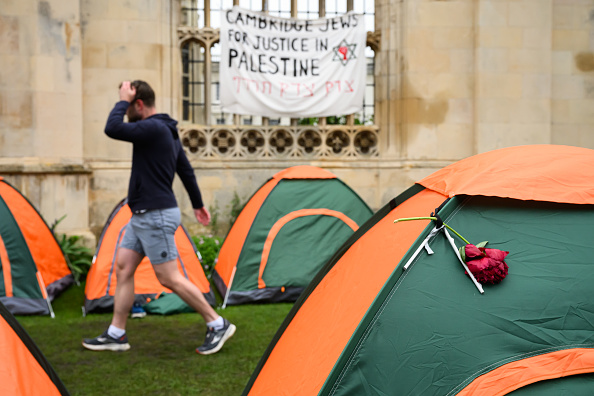University students across the UK are setting up encampments to show solidarity with Palestine, with London School of Economics (LSE) students even producing a detailed report accusing their university of “institutional complicity” in Israeli crimes against the Palestinian people.
LSE students have set up pop-up tents inside the university’s main building. Activists are calling for LSE to divest from companies they say are complicit in genocide against Palestinians.
The damning 116-page “Assets in Apartheid” report was authored by “a group of concerned students and staff” from the LSE.
It claims the LSE invests £89 million in various companies involved in activities, including supporting the Israeli military.
Protest encampments have sprung up on many university campuses across the UK, the US, and Europe, demanding an end to Israel’s genocide in occupied Palestine.
These demonstrations take inspiration from American campuses, where over 1,000 students have faced arrests by riot police for similar protests.
Students at The School of Oriental and African Studies (SOAS) have set up an encampment, demanding the university sever ties with businesses funding military weapons and Haifa University in Israel.
In a social media post, the SOAS Jewish Society expressed solidarity with the protesters, saying it stood “shoulder to shoulder with our classmates and colleagues at the SOAS Liberated Zone for Gaza.”
It comes as reports over the weekend revealed that Trinity College Cambridge student union passed a motion that calls on the institution’s administration to divest from all companies ‘complicit’ in the war on Gaza.
In March, Trinity College divested from arms companies following months of student pressure, according to the Middle East Eye.
The establishment of encampments at elite universities like Oxford and Cambridge shows that the pro-Palestinian movement has permeated institutions across the academic spectrum.
And student protests have achieved results. Trinity College Dublin, Ireland’s oldest and most prestigious university, announced last week its decision to divest from Israeli companies after negotiations with students.
Assets in Apartheid report
The student-led report says that in November 2023, LSE’s Palestine Society wrote an open letter to senior management, calling for LSE to divest its endowment from “all investment in companies complicit in Israeli apartheid and genocide of Palestinians.”
“Unfortunately, LSE has not taken responsibility for or attempted to end their institutional complicity in Israeli crimes against the Palestinian people,” it adds.
It says LSE has investments worth £48.5m in 80 holdings in 53 companies “that are involved in crimes against the Palestinian people.”
LSE’s Environmental, Social, and Governance (ESG) policy governs how it invests its endowment, valued at approximately £485 million.
The report acknowledges shortcomings in LSE’s ESG framework and has identified activities that warrant divestment from companies involved in them.
One of those activities is “crimes against the Palestinian people, including through supporting illegal Israeli settlements; and/or supporting the Israeli military; and/or sustaining apartheid.”
“This report clearly demonstrates that LSE currently invests in fossil fuels, arms manufacture, and crimes against the Palestinian people, making the university complicit in genocide,” says the report.
Based on the research, the report urges the LSE take urgent action and recommends ways to address issues related to governance, transparency, ESG policy, and divestment.
“It is incumbent that people of conscience everywhere cease ignoring or abetting Israel’s crimes and other illegal actions against the Palestinian people and take steps to hold complicit institutions accountable,” says the report
“Yet UK higher education institutions have largely remained silent about these crimes and have taken little to no action to divest from complicity in them,” it adds.
An LSE spokesperson told the BBC: “Following a rally on the LSE campus, some protesters entered and occupied part of the ground floor of the LSE Marshall Building, highlighting a range of demands relating to investments.
“We will carefully consider the report submitted by the protest group and respond in due course. We will also continue to engage in a peaceful dialogue.”









